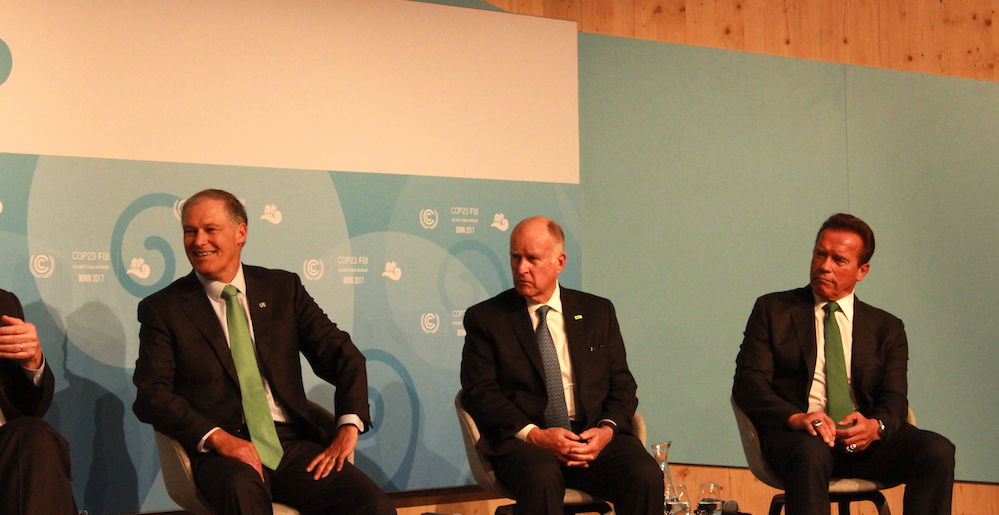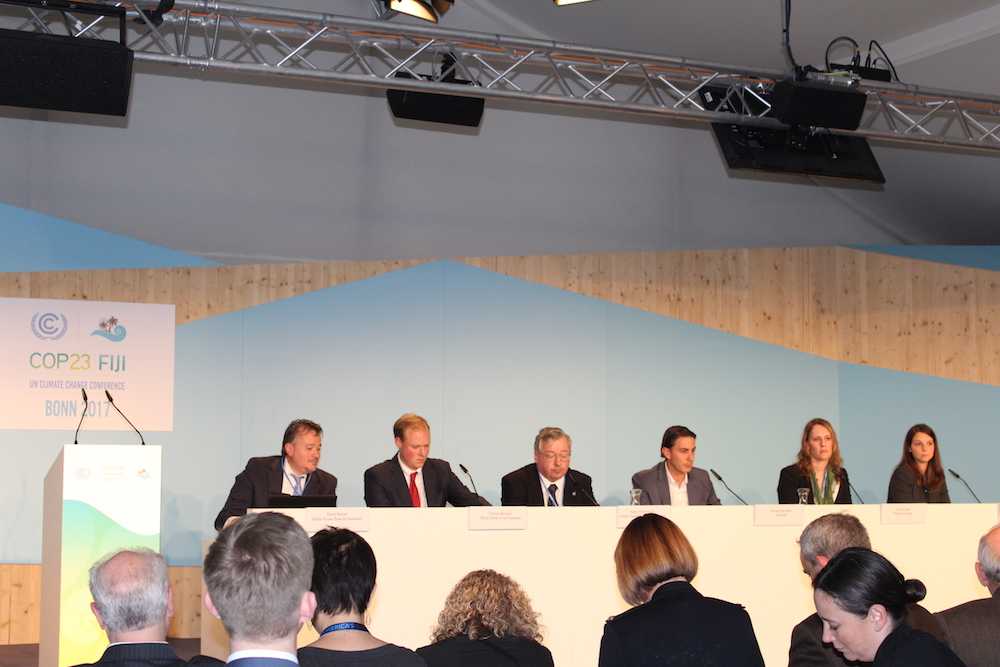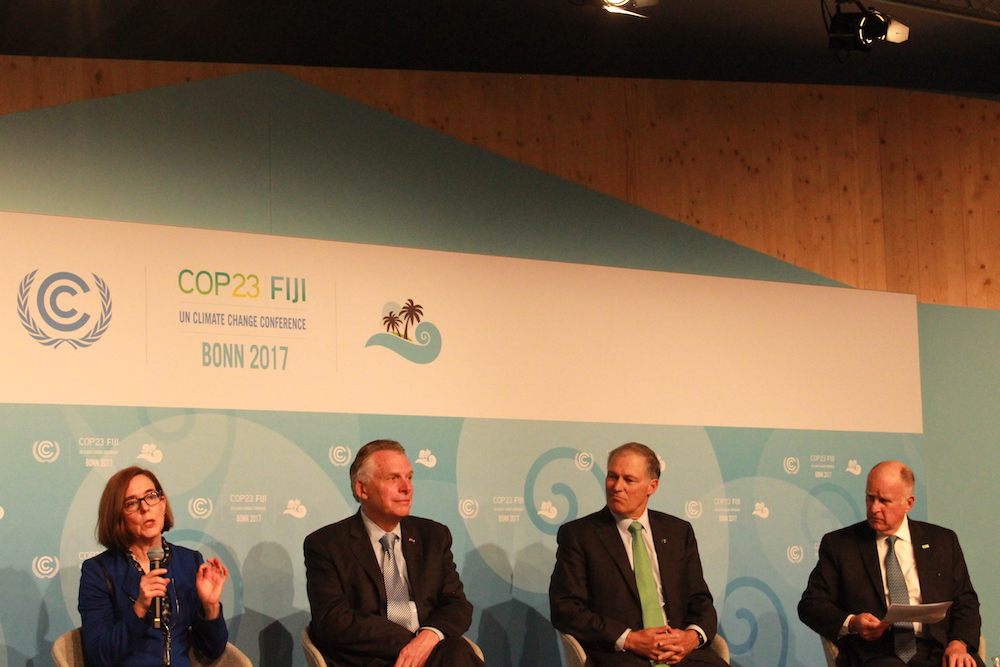BONN, GERMANY – From the United Nations climate summit in Bonn, Germany, Arnold Schwarzenegger declared he wasn’t worried about Donald Trump — not his threats to withdraw from the Paris agreement or his plan to bring back coal.
“Imagine bringing back coal,” laughed the former California governor. “In a time when coal is plummeting in the United States and all over the world … It’s like bringing back Blockbuster or something.”
But that is exactly in line with the plan embraced by the Trump administration at these climate talks — where coal deals are even rumored to be a possible outcome. Today the administration held its only organized event of the summit, a “side event” which promoted “cleaner and more efficient” fossil fuels and nuclear power as “vital” ways to reach the goals of the Paris accord.
But not everyone here from the U.S. is on board with this view.
“This is a sideshow, a blip,” said Washington Governor Jay Inslee just before the U.S. event. “The world is not going to listen to someone who says climate change is a hoax.”
World’s Largest Coal Company at Climate Summit
No one on the U.S. panel seemed very excited about answering questions. From left, George David Banks, Trump’s special energy assistant; Francis Brooke, Vice President Mike Pence’s assistant; Barry Worthington, United States Energy Association; Amos Hochstein, Tellurian; Krutka, Peabody; Lenka Kollar, NuScale Power. Credit: Ashley Braun, DeSmog
In addition to two White House representatives, the controversial U.S. “side event” featured speakers from Peabody Energy (the world’s largest private coal company, which filed for bankruptcy in 2016), Tellurian (a natural gas company investing big in exporting liquefied natural gas, or LNG), United States Energy Association (a trade group for energy companies, utilities, and organizations such as ExxonMobil, American Petroleum Institute, and of course Peabody and Tellurian), and NuScale Power (a small-scale nuclear energy company).
More than an hour before the event began, hundreds of people lined up in an attempt to get one of the 180 seats in the room.
Among those who were successful was a large group of youth and multiracial protesters from Indigenous Environmental Network, SustainUS, It Takes Roots, and 350.org, who filled about half the room. Early into the event, they disrupted the presentation for eight minutes by standing and singing, which included adapting the song “God Bless the USA” with lyrics about standing up against coal mines and greed.
Meanwhile, those protesters who remained outside staged a sit-in blocking the entrance to that part of the building. They chanted phrases such as “Keep it in the ground. Climate justice now” until their counterparts marched out of the event. The group converged on a nearby stage to sing lyrics including, “We the people are ready to lead.” That afternoon, the watchdog group Corporate Accountability International and a network of Pacific Islanders delivered a petition signed by 100,000 Americans asking the U.S. delegation to step aside from blocking progress at the climate talks.
Cleaning up Coal and ‘Anti-Fossil Fuel Bias’
But back inside the U.S. event, the people speaking were mainly repeating the same types of messages for using fossil fuels that have been used before, though, depending on the speaker, the message became a little disjointed. A common assertion was that the world is using fossil fuels now and into the foreseeable future and should therefore continue investing in infrastructure to use coal more efficiently.
“Some people believe there is no path forward for fossil fuels in a carbon constrained world,” said Holly Krutka, Peabody’s Vice President of Coal Generation and Emissions Technologies. However, she holds that current technologies and those in the pipeline such as high-efficiency coal plants can help coal reduce its emissions, which is vital to achieving the goals of the Paris Agreement.
A slide from Peabody’s presentation on coal and reducing greenhouse gas emissions. Credit: Ashley Braun, DeSmog
Both this event and one earlier in the day on carbon capture and sequestration (CCS) pointed to forecasts that nations could only limit global warming to less than 2 degrees Celsius with CCS. Yet the majority of CCS projects around the world use captured carbon dioxide (CO2) to pump more oil out of already drilled oil wells.
Barry Worthington of the United States Energy Association was very keen on the future of CCS. He commented how worried he and his colleagues at a United Nations committee on cleaner fossil fuel electricity were that this approach would be left out or discouraged in the final language of the Paris Agreement.
Worthington also lamented what he considered an “anti-fossil fuel bias” from U.S. and international financial institutions such as the Export-Import Bank and U.S. Agency for International Development (AID). Alex Doukas at Oil Change International, who was in the audience, was incredulous at this framing and questioned Worthington’s numbers, countering that in recent years U.S. institutions have been funding fossil fuel projects — though perhaps less coal — at a six-to-one ratio.
Other justifications for continued fossil fuel use included the need to increase energy access for developing nations, an argument frequently made by but with little to show from energy executives, including now Secretary of State Rex Tillerson. That argument is perhaps at odds with both Trump’s “America First” policy of focusing on domestic issues as well as the idea that U.S. investment in LNG exports is a national security issue for other nations relying on one source of oil or gas.
Happy to supply the world with U.S. natural gas, Tellurian’s Amos Hochstein, a former Obama administration official, was making an effusive case for LNG. However, he was operating under the assumption that natural gas was a “cleaner” fossil fuel despite the climate-damaging methane pollution released during the full lifecycle of gas production.
Marching Forward Even with Trump
When asked by a Chinese journalist, George David Banks, the president’s energy advisor, defended Trump’s 2012 tweet about climate change being a hoax from the Chinese. He said that people forget about the rest of the tweet, that it was a hoax from the Chinese meant to undermine U.S. manufacturing, and that this defense of American competitiveness was the point of it.
Again, U.S. governors at the climate talks would have disagreed strongly with this point.
In a statement to the press before the U.S. event, Oregon Governor Kate Brown said, “President Trump is rejecting the economy of the future,” and went on to cite executive orders she recently signed supporting green buildings and electric vehicles.
Left, Oregon Governor Kate Brown, Virginia Governor Terry McAuliffe, Washington Governor Jay Inslee, and California Governor Jerry Brown. Credit: Ashley Braun, DeSmog
That morning, Gov. Inslee said that he understands climate change is more than just an environmental challenge: “It is the largest economic opportunity since the invention of the steam engine.”
At the same U.S. governors event, Schwarzenegger reminded the audience that in light of the climate action coming from U.S. states, cities, and other local organizations — a common message at the Bonn summit — relying on the federal government was a mistake. California had cleaned up its notorious smog, and saved lives, by taking matters into its own hands. He expected states, industry,
“I don’t wait for the next election. I don’t hope there’s a different president,” he said. “We can march forward even with Trump being out there living in the Stone Age and thinking he has to bring back coal.”
Main image: Washington Governor Jay Inslee and California’s current and former governors, Jerry Brown and Arnold Schwarzenegger, at the United Nations climate talks in Bonn, Germany. Credit: Ashley Braun, DeSmog
Subscribe to our newsletter
Stay up to date with DeSmog news and alerts








